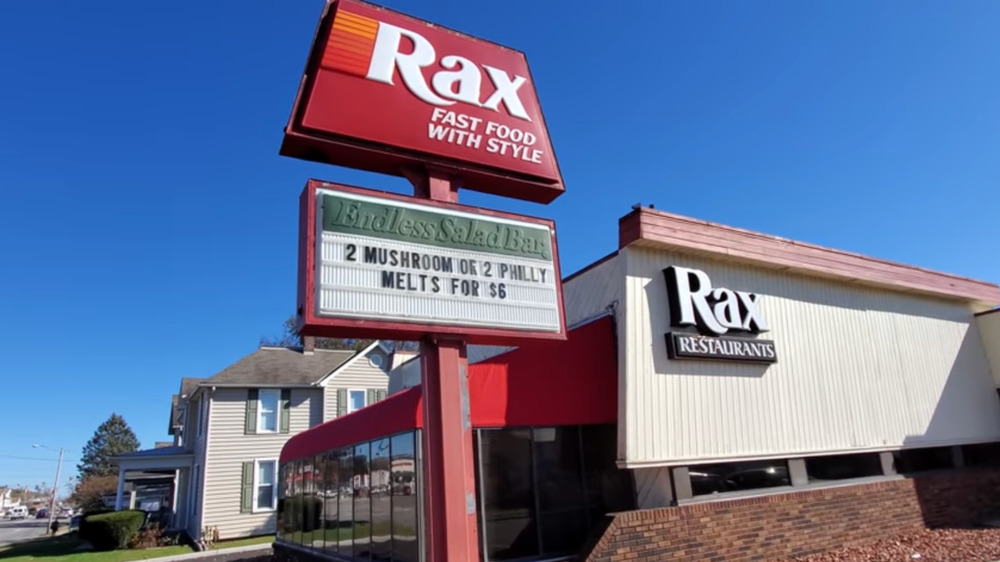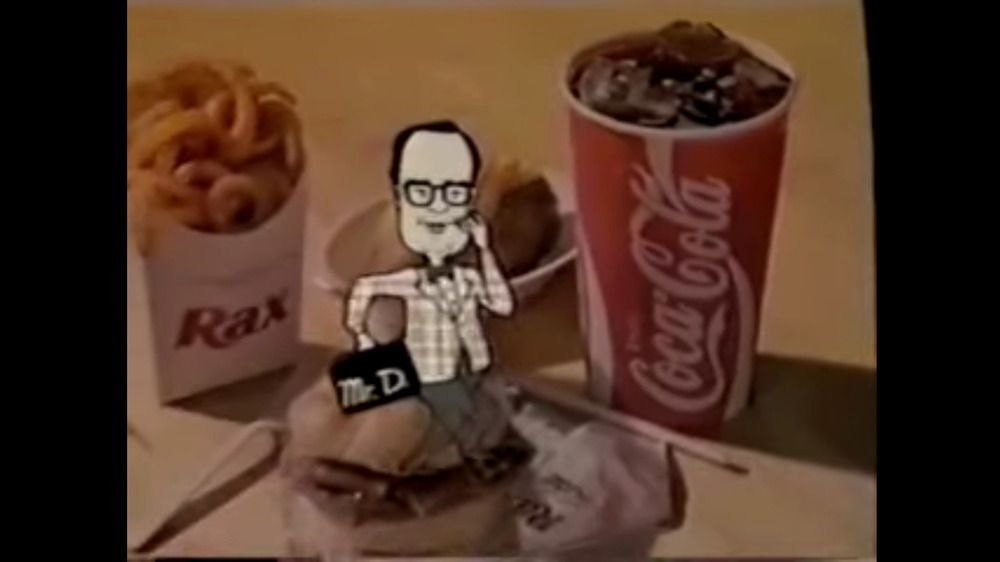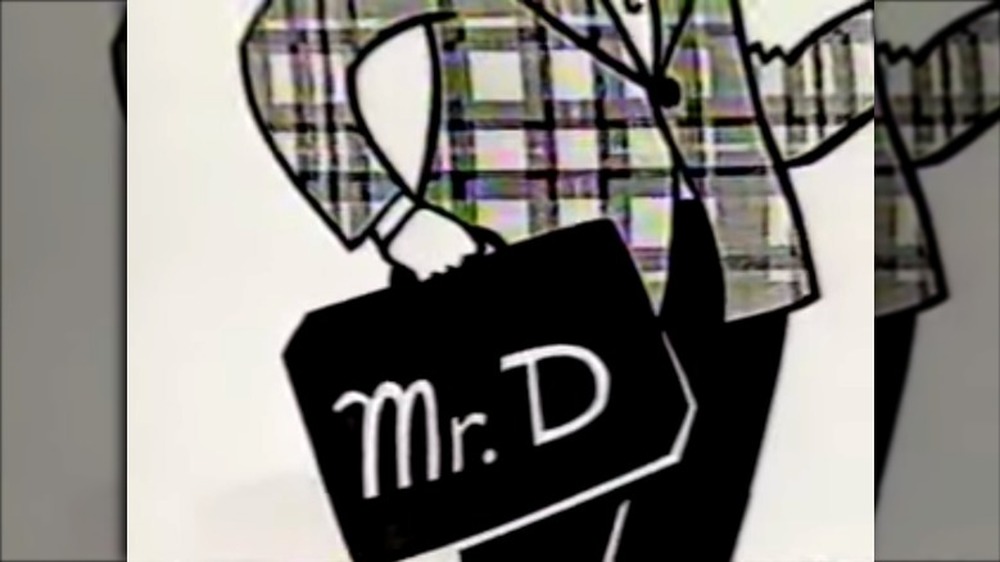The Reason This Fast Food Chain Was A Huge Failure
Can an ad campaign kill a fast food chain? It would be an impressive feat. Several chains have trotted out some truly horrific mascots or spokes-creatures and survived — and sometimes even thrived. Ronald McDonald, the Burger King, and even the Chick-fil-A cows all make some "worst fast food mascots" lists (via BabbleTop, Cafe Mom), but these chains nevertheless endure as some of the biggest fast food names in America.
One fast food mascot who didn't make any "worst" or "creepiest" lists certainly deserved this dubious honor. But while some people may remember Rax restaurants, few will recall the chain's short-lived 1992 spokesperson, Mr. Delicious. Don't let his name fool you. Mr. D was most definitely an unsavory character. If you're looking for other adjectives to describe the black-and-white cartoon figure, try misogynistic, alcoholic, and sad (via Laughing Squid).
The Mr. Delicious campaign was announced in The New York Times on August 24, 1992. Exactly three months later, Rax Restaurants Inc. filed for bankruptcy (via Inforuptcy). Shortly after that, Rax faded into obscurity. The fast food chain that got its start in Ohio in the 1960s — bearing a close resemblance to Arby's — boasted more than 500 locations by the mid-1980s (via 80s Baby).
It was an innovator, switching early on from animal fat to vegetable oil for cooking french fries, and introducing some of the first salad bars in the fast food industry (via Lost Restaurants of Columbus, Ohio). Today, only eight Rax locations remain.
Rax mascot Mr. Delicious was supposed to be an honest, adult voice
We may cringe, but let's look anyway at Rax's complete disaster of a fast food mascot, Mr. Delicious. Could he have caused Rax's demise? Top executives at the chain and its advertising agency produced a 13-minute video, available on YouTube, that introduces Mr. D and tries to explain why the animated man with an outdated sport coat was a good idea.
"Given that we're an adult fast food place, we thought that we wanted an adult character and person to be talking to our customers," Rax president Bill Underwood says in the video. Rax's idea of "adult" apparently included dangerously flawed. Underwood goes on to say, "Mr. Delicious speaks honestly to the kinds of problems and issues that we all face. Nobody else out there's doing that." We can only hope there weren't too many American men who found Mr. Delicious relatable. He complained that his ex-wife "took him to the cleaners." He said his current wife's cooking was so bad, he needed to eat at Rax every day. In other ads, Mr. Delicious confesses to a serious drinking problem and a violent urge around children.
The Rax mascot actually combined adult with boring
When Rax executives talked about how edgy and effective Mr. Delicious would be as the company's new mascot, they only proved they weren't as tuned into the times as they thought. "I think he's going to help update our image," Underwood, the Rax president, says in the video. But Mr. D hardly reflected early-1990s culture. He was more 1950s Jack Benny than Homer Simpson.
Still, in a certain sense, Mr. Delicious firmly belonged in the '90s. A few of the Mr. D commercials are on YouTube, and someone named Jason G. Clauss placed Mr. D perfectly in a comment underneath one of those videos: "Mr D. is like the 'boring is cool' of OK Soda plus the 'fast food for adults' of the Arch Deluxe. Both were horrible failures, and this combined both of them." As if to drive home the "boring is cool" point, the Mr. D commercials came with the empty slogan, "You can eat here" (via Reddit).
The arrival of Mr. Delicious just three months before Rax declared bankruptcy says something about the chain's financial health, even before the balding cartoon man's image hit television screens and billboards. When Rax launched Mr. D, the chain was desperate. To borrow football slang, Mr. Delicious was a "hail Mary" — a last-second, go-for-it-all attempt to snatch victory from the jaws of defeat. While Mr. D failed miserably, even a spokesperson that terrible couldn't bring down a national fast food chain in three months.
The real reasons Rax failed were about its menu and the economy
So what's the real reason Rax was such a huge failure? Restaurant Finance Monitor said Rax started to lose customers when it shifted its focus from roast beef sandwiches to its salad bar. In a YouTube video that dissects Rax's demise — with heavy emphasis on Mr. D's awfulness — the Vlogbrothers explain that Rax suffered from a lack of focus that went beyond the salad bar. The menu was piled high, with tortilla bowls, three kinds of chicken sandwiches, an all-you-can-eat pasta bar, and pizza. In the fast-food business, when the menu gets too big, sales tend to falter (via CNBC). McDonald's, Taco Bell and other chains occasionally strip down their menus when they find customers and kitchen staff both getting overwhelmed.
Columbus Business First pointed to another problem with Rax: It wasn't in a good position to weather the economic downturn of the early 1990s. Rax was spread too thin with its hundreds of locations. The company simply couldn't afford to support them all. Instead of trying to fix its problems, Rax turned to Mr. Delicious for help. And now we know how that worked out.



